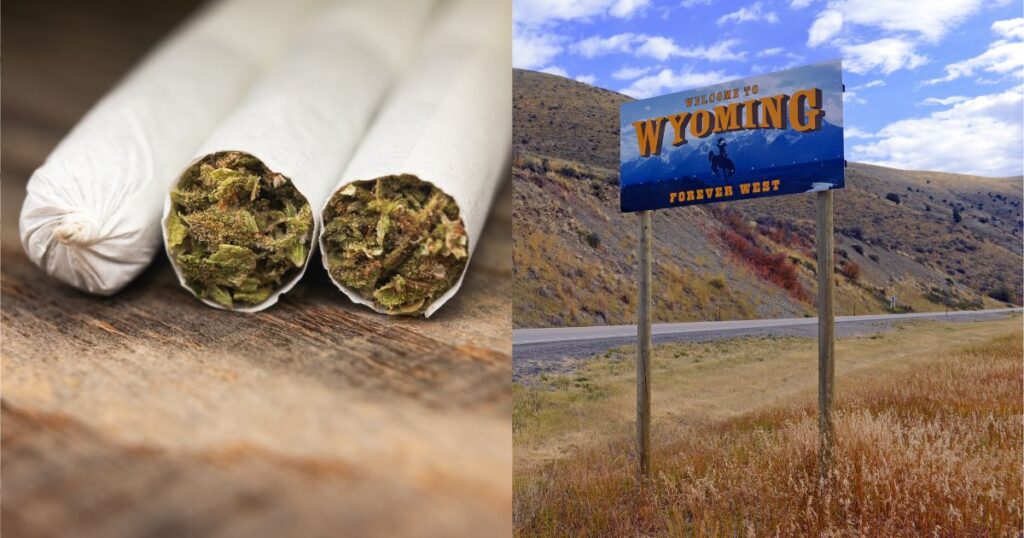The U.S. Attorney for the District of Wyoming recently made a questionable announcement: federal prosecutors will now “rigorously” pursue charges for simple marijuana possession on federal lands. This move reverses a previous, more relaxed approach and signals a renewed, aggressive stance on minor cannabis offenses.
In a state with world-renowned national parks like Yellowstone and Grand Teton, this raises serious questions. With nearly half of the United States having legalized recreational marijuana, is cracking down on tourists with small amounts of cannabis really the best use of federal resources?
A Puzzling Policy Shift
The U.S. Attorney’s Office for the District of Wyoming issued a press release stating that on September 29, 2025, the Department of Justice (DOJ) had rescinded previous guidance on prosecuting simple marijuana possession.
This earlier guidance, which came after President Biden’s pardons for federal marijuana possession offenses, had “significantly curtailed federal prosecutions of misdemeanor marijuana offenses.”
The new directive from Wyoming’s U.S. Attorney, Darin Smith, aims to reverse that trend. “Marijuana possession remains a federal crime in the United States, irrespective of varying state laws,” Smith stated. “I am committed to using every prosecutorial tool available to hold offenders accountable.”
This announcement specifically targets offenses on federal land, which makes up a substantial portion of Wyoming. While the policy affects all federal lands, the focus has naturally fallen on the state’s iconic national parks, which attract over 8 million visitors annually.
The Problem with Prosecuting Park-Goers
The push to “rigorously” prosecute minor marijuana possession in national parks seems disconnected from reality. How many news stories have you read about marijuana use causing significant problems in Yellowstone or Grand Teton?
The image of law enforcement resources being dedicated to catching someone enjoying a joint by a campfire is absurd, especially when compared to the real dangers parks face, such as wildlife encounters, environmental damage, or serious visitor accidents.
Furthermore, this policy is a clear misallocation of resources. Federal prosecutors and law enforcement officers have limited time and budgets. Focusing on minor cannabis possession means less attention can be paid to more serious crimes like violent crime, or large-scale fraud. It is a solution in search of a problem, wasting taxpayer dollars to enforce an outdated law that a growing majority of Americans oppose.
While Wyoming still criminalizes marijuana at the state level, it is an outlier. The national trend is overwhelmingly in favor of legalization. Pursuing federal charges against individuals who may be legally consuming cannabis in their home states creates a confusing and punitive legal patchwork. A tourist from a legal state visiting Wyoming could face federal prosecution for something that is perfectly legal back home.
Contradictory Messages and Questionable Priorities
U.S. Attorney Darin Smith claims that “the detrimental effects of drugs on our society are undeniable.” This statement, used to justify targeting minor cannabis possession, ignores the vast difference between substances like heroin or methamphetamine and marijuana.
Furthermore, treating cannabis like genuinely devastating drugs reflects outdated drug policies. These policies have proven ineffective and have disproportionately harmed minority communities.
The policy also stands in contrast to other recent federal actions. For instance, the same administration pardoned a runner for leaving a trail in Grand Teton. It seems illogical to offer clemency for one minor offense while vowing to crack down on another that is legal in many parts of the country.
Furthermore, this crackdown seems to be an initiative of a single U.S. Attorney’s office. When asked, U.S. Attorney’s offices in neighboring states like Colorado, Arizona, and Montana either declined to comment or did not respond, suggesting this isn’t a nationwide priority. This localized crusade makes the Wyoming office’s actions seem even more out of touch and politically motivated.
What’s Next for Wyoming?
The practical effect of this new policy will depend on how aggressively it is enforced. This policy will likely grant federal law enforcement significant discretion in its enforcement. Will park rangers now spend their time sniffing out cannabis users instead of protecting natural resources and ensuring visitor safety?
The Interior Department’s recent announcement that it is recruiting 500 new law enforcement officers for the National Park Service adds another layer of concern.
For now, visitors to Wyoming’s federal lands should be aware of this renewed risk. While federal authorities have always had the power to enforce these laws, the explicit promise to do so “rigorously” is a clear warning. This policy shift is a disappointing and counterproductive move that prioritizes a moralistic stance over common sense and effective use of public resources.
As Paul Armentano, Deputy Director of NORML, said in an email to The Independent, “it seems like a misplaced use of limited federal resources for the Trump administration to engage in ‘rigorously prosecuting’ those who possess small amounts of cannabis on federal lands.”
A Step in the Wrong Direction
Ultimately, the decision by the U.S. Attorney’s Office in Wyoming to prosecute individuals for simple marijuana possession is a step backward that disregards public opinion, modern science, and fiscal responsibility. Spending taxpayer money on these cases is inefficient and distracts from addressing the real issues facing our communities and national parks.
It’s time for federal prosecutors to align their priorities with the realities of the 21st century and focus their efforts where they are truly needed. This misguided war on weed in Wyoming’s parks is a battle that serves no one.
- Beard Bros. Pharms Cannabis Laws Road Trip – Part 2: The Midwest
- National Parks Are Still A No Toking Zone
- Beard Bros Travel Explores Redwoods National Parks
- The Current State of Cannabis Policy and the Cole Memorandum
- Minor Phytocannabinoids Unlocking New Possibilities for Cancer Treatment Per Study























